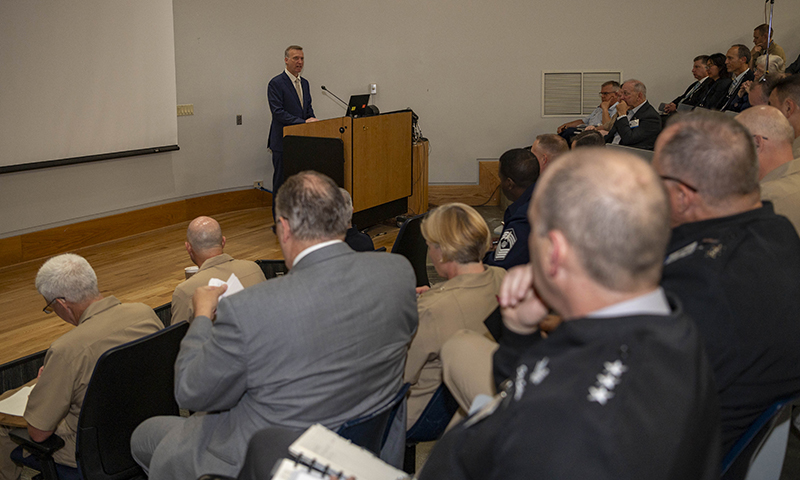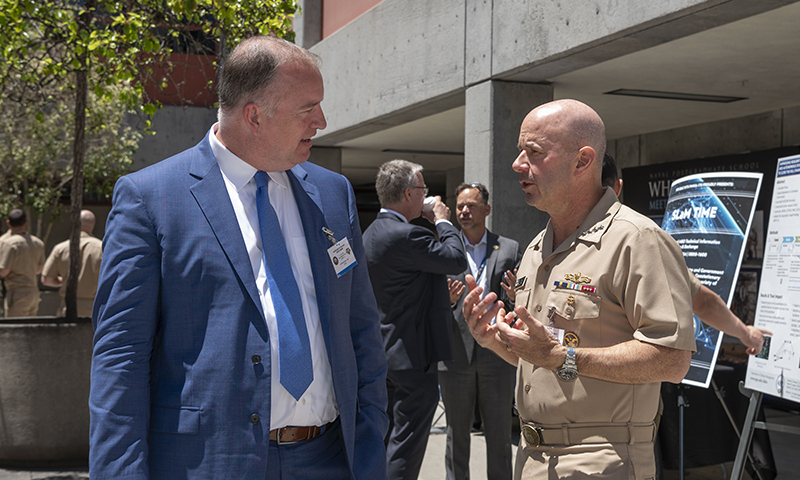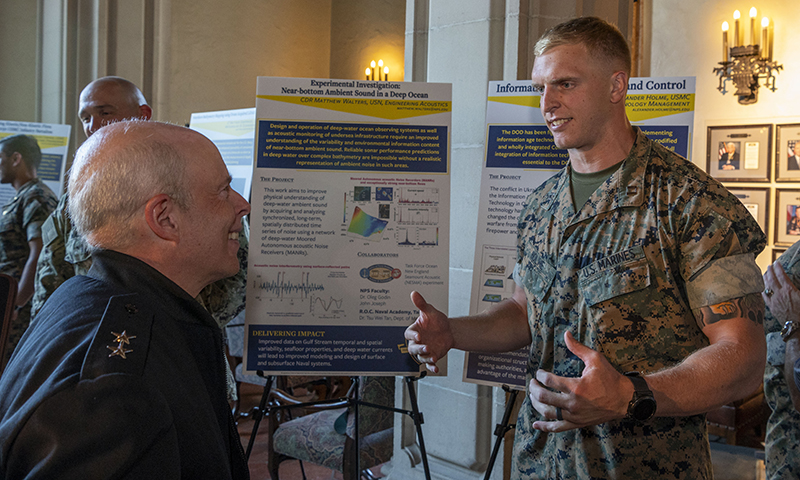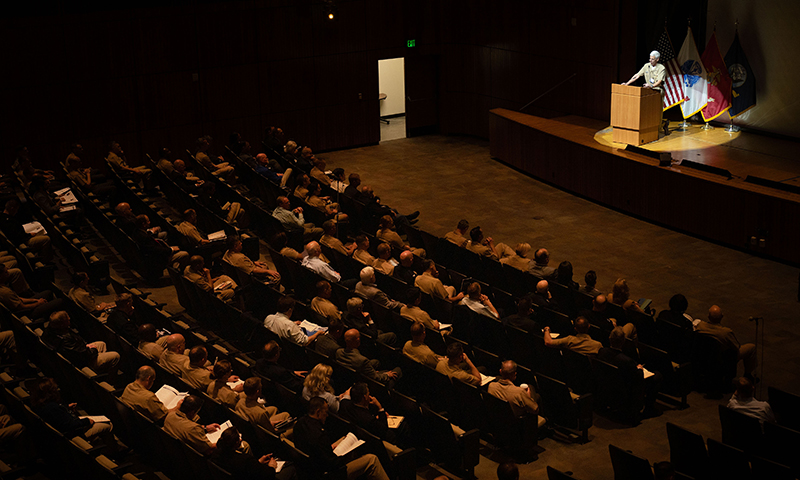Recognizing the importance of a rapidly evolving space domain to U.S. national defense, key leaders from the U.S. Navy, Marine Corps and Department of Defense gathered at the Naval Postgraduate School (NPS) for the second annual Naval Space Summit, July 9-11.
The summit, sponsored by the Secretary of the Navy and organized by the office of the Deputy Chief of Naval Operations for Information Warfare (N2N6), provides an essential venue for top DOD and Department of the Navy officials to discuss the state of space operations and capabilities within the services, as well as the latest issues and opportunities in the space domain.
Under Secretary of the Navy Erik Raven, who represented Secretary of the Navy Carlos Del Toro at the summit, reminded attendees of the similarities between the maritime domain and the space domain, as well as their importance to our nation’s history.
“The sea has left an indelible mark on history and character of our nation. For nearly 249 years, our nation has relied on the grit, tenacity, and courage of our Sailors and Marines,” said Raven. “Just as the oceans have shaped the last quarter-millennium of our nation, space will shape our future – for centuries to come.”

Vice Chief of Naval Operations Adm. James Kilby, himself an NPS graduate, acknowledged NPS’ crucial, longstanding role in space systems education, operations and engineering through the school’s Space Systems Academic Group (SSAG).
“No other venue brings together the fleet and expertise with our SPACECOM joint partners to address warfighting issues in the space domain at the most senior levels of Department of the Navy and DOD,” said Kilby. “Advancing the state of the art in space-based capability is fundamental to advancing our maritime advantage. This also requires a deep bench of talented naval leaders who understand the technologies and can develop new concepts of operations for how we fight – this is happening at NPS.”
The first Naval Space Summit in 2023 was convened by Del Toro at NPS with the goal of assessing the needs, challenges and opportunities of future maritime operations in the space domain.
For this year’s event, Raven and other senior leaders not only expanded on those themes, but also centered their discussions around strengthening U.S. warfighting capabilities in the space domain. Dialogue focused on the development of space capabilities as force multipliers, as well as the increasing demand for military and commercial space capabilities to support naval operations.
As with the inaugural event, the 2024 Naval Space Summit featured classified briefs and discussions involving DOD’s top space stakeholders, with the intent of giving attendees the opportunity to share information, make connections and continue the dialogue begun the previous year.
“Our goal this year is to build on last year’s discussions (of current military space capabilities and operations and NPS space-based research) and continue on the path to align our efforts on how we plan to fight in this critical domain,” said Vice Adm. Karl Thomas, Deputy Chief of Naval Operations for Information Warfare and Director of Naval Intelligence, during his opening address on July 9.

In addition to Raven, Kilby and Thomas, senior Navy and Marine Corps leaders who came to NPS included Vice Adm. Craig Clapperton, commander of Fleet Cyber Command, Navy Space Command and U.S. Tenth Fleet; Marine Corps Lt. Gen. Brian Cavanaugh, commanding general of Fleet Marine Force, Atlantic and Marine Forces Command; and Vice Adm. Blake Converse, deputy commander of U.S. Pacific Fleet.
Among the senior DOD and U.S. government officials attending were U.S. Space Force Gen. Stephen Whiting, commander of U.S. Space Command (SPACECOM); Space Force Lt. Gen. Douglas Schiess, commander of U.S. Space Forces-Space; U.S. Air Force Maj. Gen. Steve Butow, military deputy and director of the space portfolio at the Defense Innovation Unit (DIU); and Mr. Bale Dalton, NASA Chief of Staff.
Raven, Whiting, Schiess, Butow and Dalton presented keynote addresses during the course of the summit, while Schiess, Cavanaugh and Converse participated in a flag and general officer panel – moderated by Thomas – to discuss dependencies of warfighting on the space domain.
The majority of the other briefs during the Naval Space Summit’s agenda were presented by senior DOD and DON representatives, as well as subject matter experts from other U.S. government agencies.
As the host of the Naval Space Summit, NPS – and in particular SSAG – provided substantial contributions to the summit’s agenda, ranging from student research presentations during the opening session in King Hall Auditorium to student showcase events later in the week.
“Bringing the Naval Space Summit back to NPS reinforces the importance of our institution as a center of space education, research and innovation for the Navy and Marine Corps,” said retired Vice Adm. Ann Rondeau, President of NPS.
Rondeau, NPS Acting Provost Dr. Jim Newman and SSAG Acting Chair Dr. Wenschel Lan all spoke during the opening session, which saw presentations by three NPS students – Marine Corps Maj. Dillon Pierce and Navy Lt. Chuck Bibbs and Lt. Conor Murtha.
“The underlying message of the Naval Space Summit aligns closely with the lessons from NPS' space policy and space strategy courses,” said Bibbs, who graduated from NPS in December 2023 with dual master’s degrees before returning to support the school’s Space Systems research efforts. “Both emphasize the need for military and commercial partners to develop solutions proactively to address imminent space challenges posed by adversaries.
“NPS serves as the perfect venue for these crucial conversations, offering junior and mid-level officers the opportunity to listen to general and flag officers and familiarize themselves with these challenges early in their careers, and for them to hear our ideas. I was grateful for the opportunity to share my story and research with these senior leaders.”
Among the NPS students attending sessions throughout the week were Navy and Marine Corps officers who had been designated as Maritime Space Officers – individuals with space expertise who will directly support Navy and Marine Corps activities in key space-oriented billets.

Students from SSAG also had the opportunity to provide updates on their own space-based research during a showcase event and poster session, and a separate Emerging Tech Showcase gave summit participants a chance to learn more from industry partners who have signed Cooperative Research and Development Agreements (CRADAs) with NPS to support relevant research efforts.
“Having the Naval Space Summit at NPS was a great opportunity for our students,” Lan said. “Not only were they able to hear from our naval and joint space leaders and engage with them firsthand, the meaningful discussions have already enhanced course lectures and spurred future thesis research ideas.”
The participation of non-Navy agencies in the Naval Space Summit, including NASA and the Space Force, served as a reminder that space operations are truly a joint effort – something which Lan believes is also reflected in NPS and its mission.
“Our student population doesn’t just include naval officers – we have officers from the other armed forces as well as our foreign partner nations, which we recognize as an incredible value as the space domain evolves,” she added. “Through the interdisciplinary nature of the Space Systems curricula at NPS, we strive to educate our students so that they can contribute towards solving real-world operational problems.”
According to Thomas, the Naval Space Summit resulted in greater information sharing and an increase in dialogue between the services – and considerable enthusiasm to continue that dialogue again next year.
“This was a busy three days of open and frank discussions on current and future issues of critical importance to the naval space mission and the future fight,” Thomas said. “Additionally, many new working relationships were established and connections made – these relationships will ensure this important work and focus continues.”


